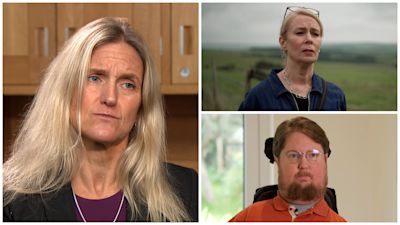Bill brought forward to legalise assisted dying

Downing Street will not interfere in the assisted dying bill's passage to becoming law, as ITV News' UK Editor Paul Brand reports
A bill will be introduced to parliament to legalise assisted dying in England and Wales.
The change in the law has been proposed by Labour MP Kim Leadbeater.
As MP for the Spen Valley, she recently topped the private members’ ballot, meaning her proposed bill will be the first to be debated.
Private members’ bills - which are proposed by backbench MPs rather than the government – rarely become law, but there has recently been growing momentum behind legalising assisted dying.
In March, ITV News filmed the now Prime Minister, Sir Keir Starmer, telling assisted dying campaigner Esther Rantzen that he wanted a debate and vote on the matter within the current parliament.
The Labour leader is personally in favour of assisted dying, but has said he would allow his MPs to have a free vote on the matter, meaning they can make their own mind up about whether to support the bill or not.
I understand the Prime Minister won't publicly champion the bill, out of respect for parliamentary procedure. Starmer is also focused on delivering his own manifesto pledges as a first priority.
However, No10 does not intend to frustrate the bill's passage, as has sometimes happened with previous private members bills under past governments.
The last time MPs voted on the issue in 2015, the bill was defeated by 330 votes to 118, but the composition of the Commons has significantly changed since then.
Labour MP Kim Leadbeater told ITV News that the current law was not fit for purpose
In her first interview since announcing her intention to bring an assisted dying bill, Leadbeater told ITV News: "I realise how important it is to have this debate. The public wants to have it and now is the time to have this conversation.
"I believe the law should change. My view is that at the moment the law is not fit for purpose, it doesn't give people the choice they deserve. We all deserve a good life and where possible the right to a good death.
"I think there's a huge amount of support for choice at the end of life."
Leadbeater went on to explain that the bill will relate to terminally ill people who have a very clear diagnosis. They will need to be mentally competent and to not have been coerced by others - it has to be their choice. She says there will be strict parameters and safeguards around the legislation.
Subscribe free to our weekly newsletter for exclusive and original coverage from ITV News. Direct to your inbox every Friday morning.
If passed, the law would arguably be the most significant social change since the legalisation of abortion and decriminalisation of homosexuality in the 1960s.
A similar bill has already made significant progress on the Isle of Man, which is likely to become the first part of the British Isles to make assisted dying available to its citizens, possibly as early as 2027.
A private members’ bill has also been proposed in Holyrood and in the House of Lords, as well as in Jersey.
Assisted dying is already legal in other countries such as Switzerland, the Netherlands, Canada and in certain American states.
Polling has consistently found a majority of the British public favour legalising assisted dying, but the issue is passionately debated by campaigners on both sides.
Helen Skelton told ITV News that the choice to have an assisted death would give her freedom for joy
In Brighton, I met Helen Skelton. She has stage four breast cancer, which has now spread to her spine and ribs. She has been told that her illness is terminal.
Allergic to morphine and other opioids, she fears that her death will ultimately be a painful one, and would like the option of a pain-free assisted death.
She told me: "My worst fear is that it I'm going to be in uncontrolled pain. It's not the death or dying that I'm frightened of, it's dying in pain.
"It would give me more freedom for joy. It's not that I want to die by assisted dying, but to be able to know that I can choose that would give me so much freedom from fear."
However, there are multiple arguments against changing the law, ranging from concerns for the vulnerable to deeply held religious beliefs about the sanctity of all life.
Miro Griffiths told ITV News that disabled people's dignity in life is being ignored
Miro Griffiths is an academic and activist, who campaigns for the rights of disabled people.
Disabled since childhood, he fears legalising assisted dying would devalue lives like his.
While the proposed law is unlikely to encapsulate people in his position, he worries it may later be expanded, as it has been in other countries.
He told me: "When there are rigid circumstances you then have a situation where more and more campaigners will say "this doesn't include me and I want to be eligible", and as we've seen across the globe, you'll then have pressure to expand criteria.
"Many disability campaigners have been arguing for dignity in life - now it seems we're going to ignore that and focus on having 'dignity in death'."
But privately, campaigners on both sides believe the law is more likely than ever to change.
The new parliament contains a majority of Labour MPs, as well as a record number of Liberal Democrats and Greens, with all three parties traditionally more sympathetic to a change in the law than the Conservatives.
All four candidates vying for the Tory leadership have either expressed strong opposition to assisted dying or have serious reservations.
It is likely that MPs will get their say on the matter before Christmas, when the bill is expected to be debated and voted upon in the Commons.